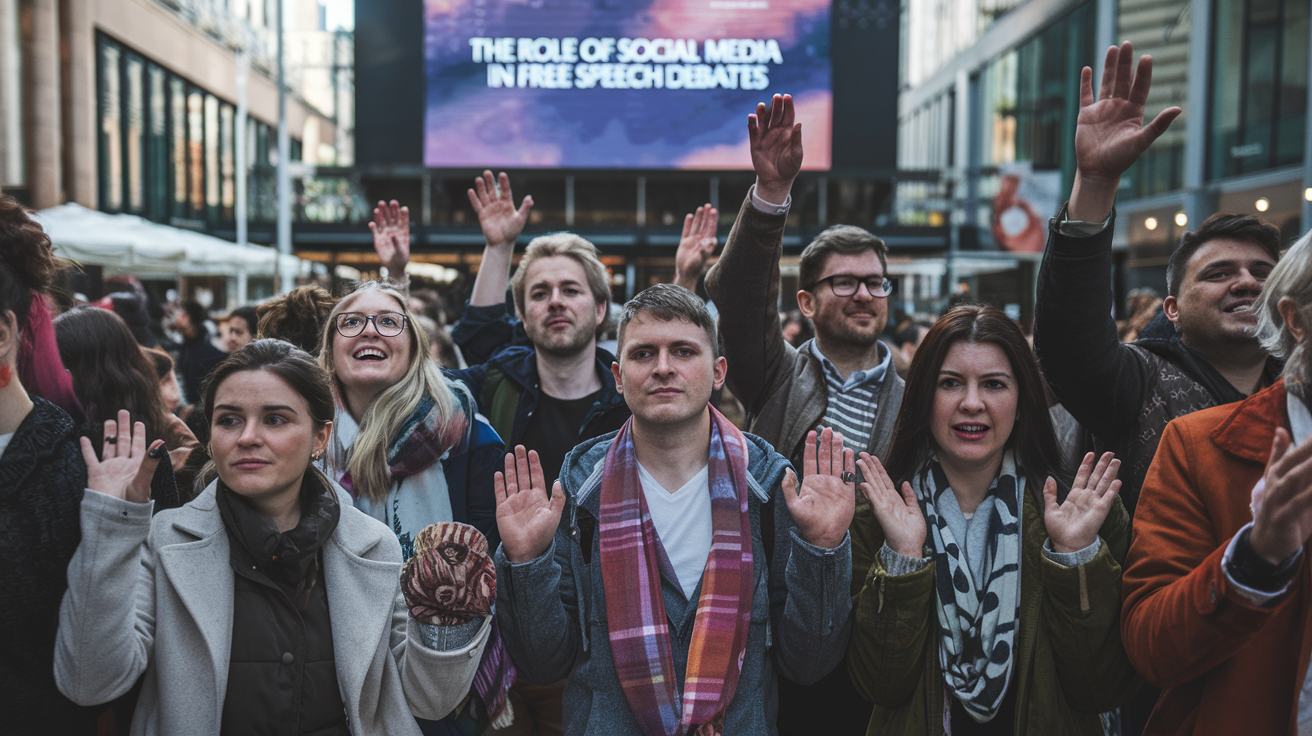TL;DR:
- The First Amendment protects free speech from government censorship but not from private companies like social media platforms.
- Platforms like Facebook, Twitter, and YouTube enforce their content rules, which can include banning hate speech and misinformation.
- Accusations of political bias arise, especially from conservatives, regarding content moderation practices.
- Supreme Court rulings affirm platforms’ rights to moderate content, but also raise concerns about fairness and bias.
- Public opinion supports regulation to address misinformation, though concerns exist over potential free speech infringements.
- Challenges include maintaining ideological diversity, technological moderation, and global regulatory compliance.
Is freedom of speech truly free on social media? This question lingers as users navigate platforms that act as both public squares and private clubs. While the First Amendment protects against government censorship, social media giants have their own say, moderating content based on internal rules.
The dance between free expression and platform regulation is complex. This article explores the boundaries of online speech, examining how these private entities shape the public conversation and what that means for the future of digital expression.
Understanding Freedom of Speech on Social Media
The First Amendment protects citizens from government censorship, allowing free speech in the U.S. This protection lets individuals express themselves without government interference. However, it doesn’t cover private companies, like social media platforms. These platforms can create their own content rules, as they are not bound by the First Amendment.
Social media companies have the power to manage content on their sites. They can remove posts, block users, or restrict speech based on their policies. While the First Amendment protects hate speech from government censorship, platforms like Facebook may ban it if it breaches their guidelines. This regulation aims to keep a safe environment but brings up concerns about bias and overreach.
| Platform | Content Regulation Policy |
|---|---|
| Prohibits hate speech, misinformation, and harmful content. Moderation is guided by community standards. | |
| Twitter or X | Enforces rules against threats, harassment, and hateful conduct. Uses both human moderators and algorithms. |
| YouTube | Regulates content that includes hate speech, misleading information, and graphic violence. Relies on community guidelines. |
Moderation on platforms can greatly affect free speech. Some users feel moderation unfairly targets certain groups or opinions. Removing posts or banning accounts can silence specific voices. This issue shows the fine line platforms walk between encouraging free expression and curbing harmful content.
The Role of Social Media in Free Speech Debates

Balancing free speech and censorship on social media is a heated debate. Platforms like Facebook and Twitter have power over what content remains. They enforce their own rules, often leading to bias claims, especially from conservatives who feel targeted. Social media firms argue their First Amendment rights allow content curation to prevent harm, yet not stifle speech. This balance is complex as platforms decide how to keep harmful content away while encouraging free speech.
- Political bias accusations: Critics claim platforms censor conservative viewpoints unfairly.
- First Amendment rights: Companies argue content control aligns with their free speech rights.
- Harassment and bullying: Platforms work to stop abuse without heavy-handed censorship.
- Spread of misinformation: Efforts to limit false information spark censorship debates.
- Monetization and algorithms: Business models and automated systems affect content regulation.
Supreme Court cases add complexity to these debates. Decisions affirm that platforms have editorial discretion, influencing state power over social media moderation. This legal framework creates a complex space where platforms balance being private content controllers and meeting public speech demands. Court rulings will shape free speech boundaries in the digital realm, affecting current and future practices.
Legal Cases Shaping Social Media and Free Speech
The Supreme Court leads significant legal cases on social media rights and the First Amendment. A core issue is if social media platforms, being private entities, can moderate content or if state laws can dictate this. These cases often equate content moderation with censorship. Court rulings emphasize platforms’ editorial rights to curate content, without breaching free speech. Yet, this draws controversy around fairness and bias in moderation.
Recent legal efforts in Texas and Florida further fuel this debate. Both states introduced laws to limit platform moderation, arguing for fairer treatment of conservative voices. Tech firms, citing First Amendment rights, challenged these laws. Courts now decide if these state rules infringe on platforms’ control rights. These cases could reshape state influence over social media, potentially creating varied regulations nation-wide.
These rulings’ future impact is massive for content moderation on social media. State power over platform policies could tighten or relax rules, affecting operations based on local preferences. Platforms could face increasing pressure to adjust moderation to comply with different state laws, adding complexity. Legal battles highlight the challenge of protecting free speech while implementing effective moderation, persistently challenging digital communication evolution.
Social Media Regulation and Its Impact on Free Speech

Public opinion strongly supports social media regulation. A Gallup survey shows 79% of Americans advocate regulation, revealing concern over unchecked platform power. This belief rests on the idea that regulation could tackle misinformation and bias. However, many fear it might hinder free speech, a fundamental democratic principle. The challenge is finding a balance that respects expression and limits harmful content.
- Pros:
- Reduces misinformation with stricter content checks.
- Promotes transparency in platform policies.
- Ensures accountability for harmful or illegal content.
- Cons:
- May infringe free speech rights protected by the First Amendment.
- Risks over-censorship, silencing valid voices.
- Challenges fair, unbiased regulation implementation.
The regulation push highlights enforcing ideological diversity challenges on platforms. Broader viewpoints can lead to healthier discussions, but enforcing such diversity isn’t straightforward. Regulation efforts may clash with constitutional rights, raising legal challenges. Platforms might struggle in applying uniform rules across diverse users, with possible unintended outcomes. Risks include further polarization and weakening free speech, presenting dilemmas for policymakers and society.
Future Prospects for Free Speech on Social Media
The future of social media free speech is unclear. Will platforms police illegal content? That remains the aim, but implementing uniform rules poses a challenge. No consensus exists on managing this balance. Platforms must allow open dialogue and protect users from harm, adding to regulation complexities. Global standards and laws add more layers, creating a web of expectations for platforms.
Ongoing talks among companies, politicians, and rights groups seek a balance between expression and safety. How do stakeholders plan to prevent harm without limiting speech? By working on frameworks respecting user rights while addressing harm. The challenge lies in policies satisfying diverse views and legal landscapes. These discussions significantly shape future speech rules, impacting digital platform operations.
Emerging Trends and Challenges
- Ideological Diversity: Pressure grows for platforms to showcase more perspectives. This aims to avoid bias but is tricky to ensure without impacting moderation rights.
- Technological Moderation: Tech increasingly aids in moderation. AI and algorithms spot harmful content yet raise accuracy and fairness concerns.
- Global Regulations: Platforms operating globally face varied legal norms. Navigating these is a large challenge.
- User Expectations: Users demand transparency in content management, influencing future policy shifts.
- Economic Pressures: Business models based on engagement may conflict with moderation aims, affecting platforms’ free speech prioritization.
Final Words
Exploring freedom of speech on social media shows a complex mix of legal rights and platform policies.
Social media companies have the power to control content despite First Amendment protections against government censorship.
Debates rage on how these platforms balance free speech with preventing harm, especially among political groups.
Legal cases further complicate the narrative, with implications for future regulation and moderation practices.
Understanding these dynamics is key.
As discussions on regulating speech evolve, it’s crucial to find ways to balance freedom of speech and responsible content moderation.
FAQ
What should be the limits of freedom of speech on social media?
The limits of freedom of speech on social media usually depend on each platform’s policies. They can moderate content like hate speech or misinformation since they aren’t bound by the First Amendment like the government is.
Does freedom of speech apply to social media?
Freedom of speech applies differently on social media. The First Amendment protects against government censorship, but private companies aren’t affected. This allows platforms like Facebook and Twitter to set their own content rules.
Can you say whatever you want on social media?
Not exactly. Social media platforms can restrict content that violates their guidelines. Unlike public spaces, these private entities can moderate posts and remove content they find inappropriate or harmful.
Do students have freedom of speech on social media?
Students have freedom of speech but face school regulations if their posts disrupt school activities. Social media platforms also regulate content based on their own rules and policies.
Is there a limit to freedom of speech on the internet?
Yes, there are limits. Online speech must comply with laws and platform rules. Social media companies can restrict harmful or offensive content per their policies, reflecting the balance between free speech and safety.

